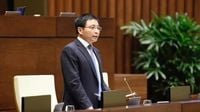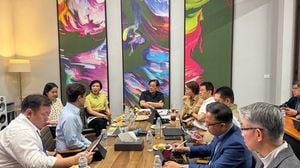On May 9, 2025, the National Assembly of Vietnam engaged in a crucial discussion regarding a draft law proposing a special consumption tax on sugary drinks. This initiative aims to address the growing concerns over obesity and diet-related non-communicable diseases, which have become significant public health issues in the country.
The proposed tax targets beverages containing more than 5 grams of sugar per 100 milliliters. The National Assembly Standing Committee views this tax as a vital step towards limiting the production and consumption of high-sugar products. The suggested implementation schedule includes an 8% tax rate starting in 2027, which would increase to 10% in 2028.
Delegate Tran Van Khai from Ha Nam province raised concerns during the session, arguing that the definition of 'sugary drinks according to Vietnamese standards' lacks clarity. He highlighted that this ambiguity could lead to confusion over whether natural products, such as coconut water and fruit juice, would be taxed similarly to carbonated soft drinks. "In reality, 200,000 coconut farmers and hundreds of processing enterprises are worried about whether their processed coconut water will be classified as sugary drinks subject to tax," Khai stated.
To mitigate potential adverse effects on the agricultural sector, Khai suggested that the tax scope be clarified to exclude nutritional or natural products like 100% fruit juice, milk, and pure coconut water. He emphasized the need for transparency for both domestic producers and importers. Furthermore, he proposed a gradual tax implementation approach, suggesting a delay until 2027 with a lower initial rate of 5-8% in the first year before increasing to 10%.
Delegate Nguyen Thi Yen Nhi from Ben Tre province supported the inclusion of sugary drinks in the special consumption tax list, emphasizing that this regulation aims to limit excessive sugar consumption and guide consumer behavior. "However, this tax is not a magic wand to change consumer habits; it requires education and awareness about the dangers of excessive sugar intake," Nhi said.
Delegate Cam Thi Man from Thanh Hoa province also expressed her support for the tax initiative, noting its connection to 25 other industries, including retail, tourism, and agriculture. She proposed a tax rate of 5% for newly taxed products to minimize negative economic impacts.
Man outlined two potential tax plans: the first plan suggests a 5% tax rate from January 1, 2027, to December 31, 2027, followed by an 8% rate in 2028, and a 10% rate starting in 2029. The second plan proposes an 8% tax rate in 2028, increasing to 10% in 2029.
In contrast, Delegate Le Hoang Anh from Gia Lai province opposed reducing the tax rate to 8%, arguing that such a rate is insufficient given the health crisis in Vietnam. He pointed to alarming statistics: over 21 million Vietnamese adults suffer from cardiovascular disease, with 200,000 annual deaths linked to this condition. Additionally, more than 5 million Vietnamese live with diabetes, and 40% of urban children are overweight or obese.
"Consumption of sugary drinks has skyrocketed, from 1.59 billion liters in 2009 to 6.67 billion liters in 2023, marking a staggering 420% increase," Anh noted. He stressed the need for strong taxation as a strategic choice for responsible nations, citing successful examples from Thailand and the Philippines, which have implemented similar taxes and seen reductions in disease rates.
Minister of Finance Nguyen Van Thang also addressed the assembly, reiterating the importance of the proposed tax. He referenced a World Health Organization (WHO) report highlighting Vietnam's alarming sugar consumption, which accounts for 46.5% of daily sugar intake, primarily from sugary beverages. "We cannot wait until future generations are obese and sick to take preventive measures," Thang asserted.
Thang explained that the draft law defines soft drinks as ready-to-drink products processed from water, which may contain sugar, food additives, and natural ingredients. However, certain products like milk, natural mineral water, and pure fruit juices will not be subject to this tax. He assured delegates that coconut water would also be exempt from the special consumption tax.
The assembly also discussed the taxation of air conditioners, with the National Assembly Standing Committee agreeing to include units with capacities between 18,000 BTU and 90,000 BTU. This decision reflects the growing demand for air conditioning in Vietnam, balancing the need for environmental considerations with consumer needs.
In response to concerns about the impact of the sugary drink tax on businesses, Minister Thang emphasized that the government is committed to a gradual implementation process. This approach aims to allow businesses to adjust their production plans and gradually transition to lower-sugar products.
As the National Assembly continues to refine the draft law, there is a collective recognition of the need to address public health challenges linked to high sugar consumption. The discussions surrounding the special consumption tax on sugary drinks reflect a broader commitment to fostering healthier lifestyles among the Vietnamese population.
In conclusion, the proposed tax on sugary drinks represents a significant step towards improving public health in Vietnam. As the government navigates the complexities of implementation, the emphasis on education and gradual adaptation will be essential in ensuring that both consumers and businesses can effectively respond to this important public health initiative.




